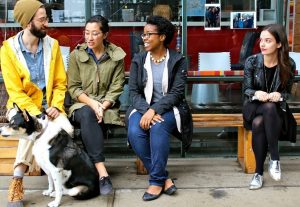
Meeting new people is an important part of our lives. Socially, as part of a working life, as employees and as customers, as we seek expertise and information – even inside our own families – we meet new people regularly. And as soon as we meet, we measure. Intrinsically, inescapably, as part of our evolutionary drive for safety and our human need for connection, we make judgements. We must. It’s because we want to feel safe with the new person – that’s the way our limbic systems work to protect us. Then we can begin to talk and work and be with them.
Listening recently to Malcolm Gladwell’s new book ‘Talking to Strangers’, he offers some brilliant insights into the upsides and downsides of our approach to judging strangers. We have a ‘default to truth’, which means we believe a great deal at face value, so it follows that we need a lot of hard evidence to make us change our minds. (That explains a lot about current UK politics). We believe that how someone looks, emotes and expresses themselves is how they truly are in character, which is not always true. Both of these impulses help to make our social interactions smooth – yet can lead us into serious errors of judgement about people, which he illustrates with in-depth case studies. I found his interview with Oprah Winfrey fascinating, it’s here://bit.ly/2p953ow
As coaches and facilitators we often work with new people. What these insights do for me is reboot my awareness of the assumptions I make as soon as I see someone new, especially if it’s someone who is ‘not like me’. Gladwell also talks about ‘mismatching’: how our strong belief that external characteristics and behaviours reveal the inner person can be very misleading, because it can be true, and often it’s not.
Since it’s virtually impossible to avoid falling into some or all of these traps, the wise money is on being aware, on checking assumptions before and while in conversation, on noticing our ‘not like me’ tendencies, on humbly acknowledging that we are nothing like as good at understanding others as we like to think we are.
So much of training, even some coaching, is about encouraging someone else to think and be ‘like me’. The unique power of the Thinking Environment means that we can think as and for ourselves, which in today’s world is increasingly radical. Disruptive. And vital.
What can you do during 2020 to support yourself as an independent thinker? If I can contribute to that in any way, please let me know.
